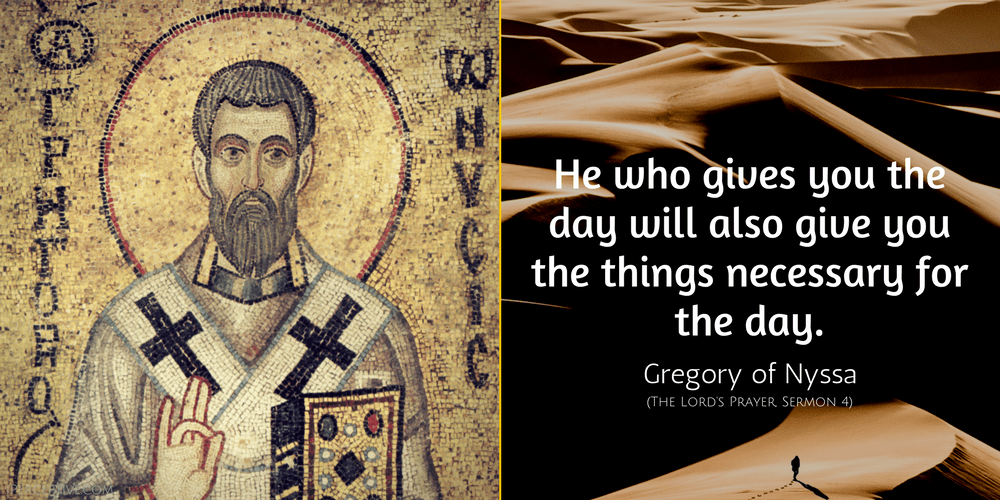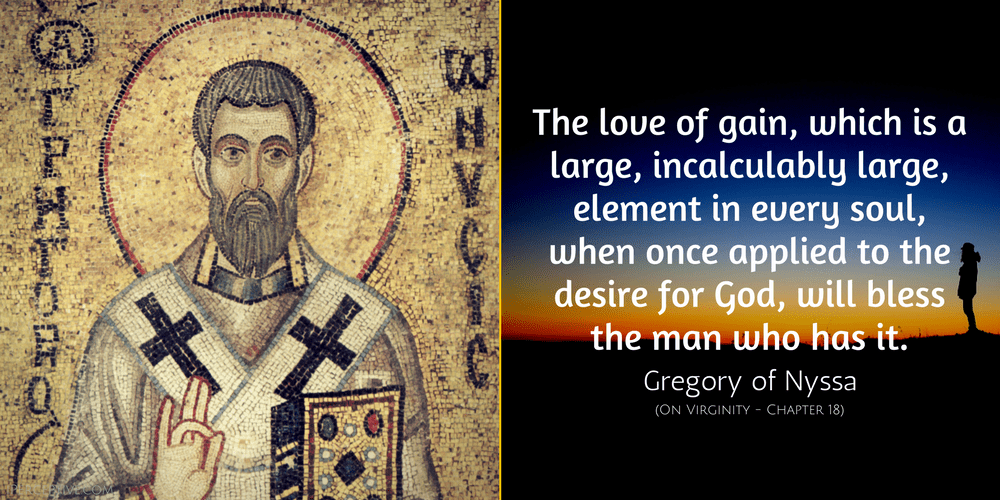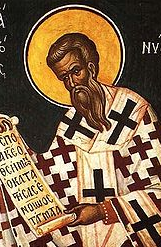Gregory of Nyssa Quotes

Anger is a perversion of courage, as lust is a perversion of love.
For profane education is truly barren. It is always in labor, but never gives birth.
It is impossible for one to live without tears who considers things exactly as they are.
Since with all my soul I behold the face of my beloved, therefore all the beauty of his form is seen in me.
As virtue is a thing that has no master, that is, is free, everything that is free will be united with virtue.
Knowing, then, how widely the Divine nature differs from our own, let us quietly remain within our proper limits.

He who gives you the day will also give you the things necessary for the day.
Concepts create idols; only wonder comprehends anything. People kill one another over idols. Wonder makes us fall to our knees.
For when one considers the universe, can anyone be so simple-minded as not to believe that the Divine is present in everything, pervading, embracing and penetrating it?
Every concept that comes from some comprehensible image, by an approximate understanding and by guessing at the Divine nature, constitutes a idol of God and does not proclaim God.
There is one true and perfect power which is above all things and governs the whole universe. But it rules not by violence and tyrannical dictatorship, which inforces the obedience of its subjects through fear and compulsion.
God would not therefore reduce the human race to slavery, since he himself, when we had been enslaved to sin, spontaneously recalled us to freedom. But if God does not enslave what is free, who is he that sets his own power above God's?

The love of gain, which is a large, incalculably large, element in every soul, when once applied to the desire for God, will bless the man who has it.
God says to you as it were: He who gives you the day will also give you the things necessary for the day. Who goes the sun to rise? Who makes the darkness of the night to disappear? Who shows you the ray of light? Who revolves the sky so that the source of light is above the earth?
Slaves who have been freed and cease to serve their former masters, the very moment they become their own masters, direct all their thoughts towards themselves so, I take it, the soul which has been freed from ministering to the body becomes at once cognizant of its own inherent energy.
Just as at sea those who are carried away from the direction of the harbor bring themselves back on course by a clear sign, on seeing a tall beacon light or some mountain peak coming into view, so Scripture may guide those adrift on the sea of the life back into the harbor of the divine will.
As, when one torch has been fired, flame is transmitted to all the neighbouring candlesticks, without either the first light being lessened or blazing with unequal brilliance on the other points where it has been caught; so the saintliness of a life is transmitted from him who has achieved it, to those who come within his circle.
This truly is the vision of God: never to be satisfied in the desire to see him. But one must always, by looking at what he can see, rekindle his desire to see more. Thus, no limit would interrupt growth in the ascent to God, since no limit to the Good can be found nor is the increasing of desire for the Good brought to an end because it is satisfied.
So when did these last two originate? They transcend “whenness,” but if I must give a naive answer—when the Father did. When was that? There has not been a “when” when the Father has not been in existence. This, then, is true of the Son and of the Holy Spirit. Put another question and I will answer it. Since when has the Son been begotten? Since as long as the Father has not been begotten.
Hope always draws the soul from the beauty which is seen to what is beyond, always kindles the desire for the hidden through what is constantly perceived. Therefore the ardent lover of beauty, although receiving what is always visible as an image of what he desires, yet longs to be filled with the very stamp of the archetype. And the bold request which goes up the mountains of desire asks this: to empty the Beauty not in mirrors and reflections, but face to face.
Just as the person who looks upon the perceptible cosmos and has grasped the Wisdom that is displayed in the beauty of these beings infers, on the basis of what the eye sees, the invisible Beauty and the wellspring of Wisdom, whose outflow contrived the natural order of what is, so too the person who attends to this new cosmos that appears in the creation of the church sees in it the One who is and is becoming ”all in all” (cf. 1 Cor 15:28) as, by way of the things our nature can take in and comprehend, he directs our knowledge toward that which cannot be contained.
The climbing soul, leaving all that she has grasped already as too narrow for her needs, will thus grasp the idea of that magnificence which is exalted far above the heavens. But how can any one reach to this, whose ambitions creep below? ... He therefore who keeps away from all bitterness and all the noisome effluvia of the flesh, and raises himself on the aforesaid wings above all low earthly ambitions, or, more than that, above the whole universe itself, will be the man to find that which is alone worth loving, and to become himself as beautiful as the Beauty which he has touched and entered.
Just as, in the case of the sunlight, on one who has never from the day of his birth seen it, all efforts at translating it into words are quite thrown away; you cannot make the splendour of the ray shine through his ears; in like manner, to see the beauty of the true and intellectual light, each man has need of eyes of his own; and he who by a gift of Divine inspiration can see it retains his ecstasy unexpressed in the depths of his consciousness; while he who sees it not cannot be made to know even the greatness of his loss. How should he? This good escapes his perception, and it cannot be represented to him; it is unspeakable, and cannot be delineated. We have not learned the peculiar language expressive of this beauty. … What words could be invented to show the greatness of this loss to him who suffers it?
For the majority, I take it, who live all their lives with such obtuse faculties of thinking, it is a difficult thing to perform this feat of mental analysis and of discriminating the material vehicle from the immanent beauty, … Owing to this men give up all search after the true Beauty. Some slide into mere sensuality. Others incline in their desires to dead metallic coin. Others limit their imagination of the beautiful to worldly honours, fame, and power. There is another class which is enthusiastic about art and science. The most debased make their gluttony the test of what is good. But he who turns from all grosser thoughts and all passionate longings after what is seeming, and explores the nature of the beauty which is simple, immaterial, formless, would never make a mistake like that when he has to choose between all the objects of desire; he would never be so misled by these attractions as not to see the transient character of their pleasures and not to win his way to an utter contempt for every one of them. This, then, is the path to lead us to the discovery of the Beautiful. All other objects that attract men's love, be they never so fashionable, be they prized never so much and embraced never so eagerly, must be left below us, as too low, too fleeting, to employ the powers of loving which we possess; not indeed that those powers are to be locked up within us unused and motionless; but only that they must first be cleansed from all lower longings; then we must lift them to that height to which sense can never reach.
Are you not ashamed, you little clay doll, soon to be dust, blown up like a bubble with your own momentary puff, full of pride, all swollen with inflamed delusion and inflating your mind with empty conceit? Do you not see at each end the limits of human life, how it begins and where it ends? Yet you glory in your youth, you look to the blossom of your fresh years, and you boast of your full bloom, because your hands are strong for lifting, your feet agile for jumping, your curls blow about in the wind...
Yes, perhaps you look even to your shoes, carefully polished with blacking and smart with extravagantly stitched lines, yet do you not look at yourself? I will show you your reflection, who you are and what you are. Have you not seen in the burial ground the mysteries of our existence? Have you not seen the heap of bones piled on each other, skulls stripped of flesh, staring fearsome and horrible from empty eye-sockets? Have you seen the grinning mouths and the rest of the limbs lying casually about? If you have seen those things, then in them you have seen yourself...
What faint shadow so escapes our grasp as the dream of youth, no sooner appearing than instantly flown? So much for those who are foolish in their youth because they have not yet grown up. What might be said about those now of established maturity, whose youth has gone, but their character is unstable, and the disease of pride increases? The name they give to this infirmity of character is 'dignity'. As often as not imperial office and the exercise of its power become the excuse for pride...
Those however who strut on the stage of life because of imperial office...
They stay no longer within the bounds of human nature, but assume divine power and authority. They believe they have sovereignty over life and death because to some of those who are judged by them they give sentence of acquittal, while others they condemn to death; and they do not even consider who is truly the sovereign of human life and determines both the beginning of existence and its end. Nevertheless this alone should have been enough to restrain vain conceit, the sight of many rulers even during the performance of their reign snatched from their very thrones and carried out to their graves, and for them lamentation has replaced the cries of the heralds. How then can he be sovereign over life which does not belong to him, when his own does not belong to him? Even that person, therefore, if he becomes poor in spirit, looking to the one who willingly became poor because of us, and observing the equal respect we owe to members of our race, will not inflict injury on those who share his origin as a result of that mistaken masquerade of government

